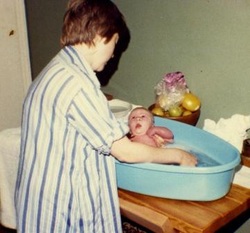
By the time Tom was born, in 1982, the Mothers' had been taken over by the NHS, but it was still staffed by a number of Salvation Army nurses. I had never been a regular churchgoer, nor was I a confirmed Christian, but at this powerfully moving time of my life, I found it profoundly comforting when the nurses came in to our small ward and offered prayers and hymns.
I was also grateful for the opportunity given by the hospital to stay in for almost a week, as I grew used to the idea of being a mother, and to having such a huge new responsibility now my son was in the world. The Mothers' had a number of traditions, one being that even if you were a repeat visitor to the maternity hospital, you were still invited to attend the lesson on bathing baby!
Over the 30 years since, from time to time I have met others who either gave birth or were born in the Mothers', perhaps most memorably the elderly lady I encountered while looking round the beautiful old synagogue in Dubrovnik (incidentally the only synagogue in Western Europe that remained open throughout WW2).
I will always be grateful to the Mothers' for the warm encouragement I was given.
And I continue to be grateful that I live in a time and a place where that is available for all women, and equally aware that in many parts of the world this is not the case. My own mother had eight children by the time she was 36 years old.
For those who might be interested in reading about a time when this was not so in the UK, I can most highly recommend the wonderful book Maternity: Letters from Working Women, Collected by the Women's Co-operative Guild (Virago) edited by Margaret Llewelyn Davies, first published during the First World War, in 1915. Here follows an extract, with grateful thanks to Virago:
A WAGE-EARNING MOTHER (extract from longer letter)
"I myself had some very hard times, as I had to go out to work in the mill. I was a weaver, and we had a lot of lifting to do. My first baby was born before its time, from me lifting my piece off the loom on to my shoulder, as two of us had them to lift, and then carry them from the shed across the yard to be weighed. If I had been able to take care of myself I should not have had to suffer as I did for seven weeks before that baby was born and for three months after; and then there was the baby suffering as well, as he was a weak
little thing for a long time, and cost pounds that could have been saved had I been able to stay at home and look after myself. But I could not do so, as my husband was short of work; and when I had my second baby I had to work all through again, as my husband was short of work and ill at the time. So there was another poorly baby. While I was carrying this one he only worked three months out of the nine. I could not get any support at all then. I had to go out to work again at the month-end, and put the baby out to nurse. I had to get up at four in the morning, and get my baby out of bed, wash and dress it, and then leave home by five, as I had half an hour's walk to take my baby to my mother's, and then go to my work and stand all day till half-past five at night, and then the walk home again with my baby. I had to do this with three of them. I think you will understand I have had my share; and all my children have had to be brought with instruments. I have had six living children and one miscarriage.... "
Wages 28 shillings (£1.40) a week.
Links for further reading on the Mothers' Hospital:
http://www1.salvationarmy.org.uk/uki/www_uki_ihc.nsf/stc-vw-sublinks/FFCF49855F479E718025704B0043C860?openDocument
http://health.hackneysociety.org/page_id__184_path__0p4p.aspx
http://www.homerton.nhs.uk/about-the-trust/our-history/mothers-hospital-1884-1986-/

 RSS Feed
RSS Feed
